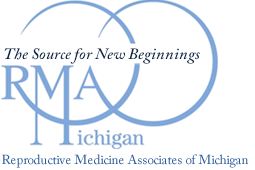
Frequently Asked Question for Egg Donors at RMA of Michigan
What are the requirements of becoming an egg donor?
RMA of Michigan has an extensive donor screening process. To initially qualify as a donor candidate, the following criteria must be met:
- Age 21-28 years old
- BMI of 18-30
- Non-smoker, no recreational drug use
- Regular monthly periods
- Currently NOT using the following methods of birth control: Depo-Provera and Implanon (implant).
- College student or graduate
During the screening process, donor candidates will be tested for a variety of hormones, genetic carrier diseases, infectious diseases, as well as psychological screening. You will be asked to provide a detailed health history of yourself and your family.
Do I have to live near your office in Troy to donate?
We recommend living within a reasonable driving distance to our office since you will need to come to our office frequently for appointments (8-10 times) during the donation month.
Is there a cost for me to be an egg donor?
As a donor candidate, you will not have any costs to you, besides the transportation you will need to the clinic. Once you have become a donor, there will be no costs incurred.
Do I need medical insurance?
RMA of Michigan provides complication insurance to all donors that are in active donation. The complication insurance will cover any complications relating to the egg donation for up to 3 months after. You will not be asked to provide an insurance card, nor will you pay for the complication insurance.
How many times can I donate?
RMA of Michigan follows the ASRM guidelines (American Society of Reproductive Medicine), which recommends that the number of donations is limited to 6 cycles in your lifetime.
What are the medications and how do I take them?
The medications used are hormones that your body produces, and they are given subcutaneously in the abdomen with ½ inch needle, very similar to how diabetics give themselves insulin. Injections are given daily, one injection a day, for approximately 10-12 days prior to egg retrieval. We will teach you how to do the injections yourself, or we can teach a friend.
How much time is needed to complete an egg donation?
While in active donation, you are required to have morning visits at the clinic for ultrasounds and lab work, about every other day while on medication. A typical visit can range about 15-30 minutes. Our clinic is open very early in the morning for labs & ultrasounds (6-8:30am), so that you are able to have the appointment done before school or work. A typical donation cycle is approximately 2-2½ weeks. You would need to take the day off for the egg retrieval. For first time donors, we recommend that you take the day off after egg retrieval as well, however the majority of egg donors are back to school or work the next day.
How many eggs do you get?
The number of eggs retrieved varies from each individual, depending on how each donor responds to the medication. A donor can produce anywhere from 5 to 30 or more.
I want to have children in the future. Am I going to run out of eggs?
Current studies show that doing egg donation does not affect your future fertility, nor will you run out of eggs or go into menopause earlier. However, there have not been adequate long-term studies done to 100% prove this.
What happens to my eggs after I donate?
Your eggs will either be frozen and placed in the Donor Egg Bank USA network, where recipients will choose from profiles, or they will be fertilized as fresh eggs for recipients.
What side effects from the medications will I have? What are the risks?
The most common side effects from the medications include: bloating, weight gain, fatigue, headaches. These symptoms can happen in varying degrees and are NOT permanent. Most of these side effects happen close to the retrieval and can last a couple of days after. Risks of the medications include ovarian hyperstimulation syndrome — which can be mild to moderate, or severe (see separate handout). Risks of egg donation include bleeding, infection, ovarian cysts.
Am I compensated as an egg donor?
You are financially compensated for your time, effort and inconvenience during the egg donation. You will receive compensation at the time of egg retrieval.
Can I go back to using my birth control after a donation?
It is highly recommended that if you are sexually active, to abstain from sexual activity during the active donation process and especially after egg retrieval until you receive your next period. Donors that recently donated are highly fertile after the egg retrieval. We recommend that you continue birth control after donation.

Contact RMA of Michigan
Website:
https://www.rmami.com/
Donor Application:
https://rmami.eggdonorconnect.com/donorprescreen/
RMA of Michigan Office Location
Troy, MI:
130 Town Center Dr #106
Troy, MI 48084